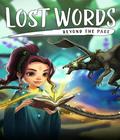For one reason or another, some games just don't work very well at E3 or any other convention. They have a steep learning curve, so playing them for 20 minutes is basically the same as not playing them at all (e.g., the average Souls clone), or they might depend heavily on isolation or silence to build atmosphere (e.g., a lot of horror games).
Lost Words: Beyond the Page, by rights, should be in that category. It's a light and silly user-shaped platform adventure that suddenly gets very real at the end of the first level. Granted, there's a lot about it that is laser-targeted at some of my particular weak points, so your results may vary, but I remained affected by the game — hell, I teared up a little bit in the middle of the Staples Center at E3 2019 — despite being in a really bad environment for it. It should not have worked as well as it did.
In a way, it's a sort of interactive pun, as Lost Words is almost literally a visual novel. It begins as words written on a blank page by a 12-year-old English girl named Izzy. She has a dorky dad, a mom who's her best friend, and a brother who's young enough that he mostly crawls around and chews on things. Izzy has decided she wants to be a writer, and she was given an empty journal by her grandmother toward that purpose.
Initially, you play Lost Words by running across the pages of Izzy's new journal, jumping from sentence to sentence like platforms, and dragging words into gaps to reach little torn holes that'll take you to the next page and the next bit of narration. Eventually, Izzy begins brainstorming ideas for her first story, a fairy tale, and you can make decisions that determine the details thereof; you can name her protagonist, choose the color of her dress, and pick her primary virtue.
Having done that, Lost Words shifts into a playable version of Izzy's story about a young girl who's appointed the Guardian of the Fireflies and sets out on an adventure. The primary mechanic there becomes the use of actual magical words, kept in a book with the heroine, which you can deploy in the world to affect her environment. In the E3 demo, the only word available was "rise," which could be used to raise platforms on screen.
After that first, relatively lighthearted chapter, though, the demo briefly cut back to Izzy's slice-of-life journal, where she'd just been hit with news of a family tragedy. Now, instead of running along her sentences, they crumble underfoot, as Izzy's indecision and despair kick in and send you plummeting. It's a weirdly effective use of the medium's interactivity. Along with the subtle details around the edges of the screen — Izzy's first chapter was written in a brightly lit room, on a desk surrounded by extra pens, but this time, she's writing late at night, in the dark — and some really effective voice acting, it put forward Izzy's sorrow in a way that hit me much harder than I was expecting.
Lost Words began as the product of a game jam, and its creative director, Mark Backler, has been working on it for about four years. Before this, he worked at Lionhead Studio and at Marmalade Games as a lead designer.
The game also features a script by Rhianna Pratchett (Mirror's Edge, Overlord, Tomb Raider), who is apparently responsible for introducing the game's themes of loss, so I'm mad at her now. The title also has a new soundtrack by David Housden, composer of Thomas Was Alone.
Thinking about it, I'm not sure it was smart to talk about the twist, as that's probably at least half of why it hit me as hard as it did. Lost Words: Beyond the Page initially starts as a lighthearted adventure through a young girl's wish-fulfillment fantasy, then it swerves hard at the end of the first stage. I'm not sure whether it'd be better to go into it cold and get ambushed by it for the full effect, or be fully aware going in that it's a bit of a deliberate tearjerker. Either way, I saw a disquieting amount of myself in Izzy, and I am both a little chagrined by the idea of playing further into her story and very curious to see where it goes.
More articles about Lost Words: Beyond the Page













 Lost Words: Beyond the Page is atmospheric puzzler, set between the pages of a diary and a fantasy land, with a story written by Rhianna Pratchett.
Lost Words: Beyond the Page is atmospheric puzzler, set between the pages of a diary and a fantasy land, with a story written by Rhianna Pratchett.




















